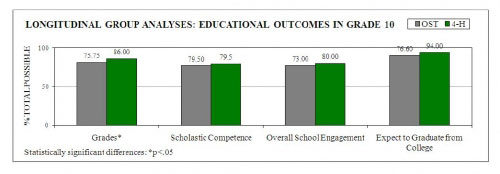MSU Extension 4-H science comes alive through questions and inquiry
Members of a Michigan State University Extension 4-H science team witnessed firsthand the power of science coming alive and having real meaning for educators when they focus on the question of science at the 4-H Science Academy in St. Louis, Missouri.
When 4-H professionals work with youth, it is through a lens of positive youth development. The Summary of Findings: 4-H Study of Positive Youth Development demonstrate that 4-H helps young people excel beyond their peers. 4-H youth:
- Exhibit higher educational achievements
- Exhibit higher motivation for future education
- Report better grades, higher levels of academic competence and an elevated level of engagement at school
- Are nearly two times more likely to plan to go to college
- Are more likely to pursue future courses or a career in science, engineering or computer technology.
 Additionally, the
study finds that girls in 4-H are more than twice as likely to participate in
science, engineering or computer technology programs as their peers. At the
same time, young people in 4-H are three
times more likely to actively contribute to their communities when compared
with youth who do not participate in 4-H.
Additionally, the
study finds that girls in 4-H are more than twice as likely to participate in
science, engineering or computer technology programs as their peers. At the
same time, young people in 4-H are three
times more likely to actively contribute to their communities when compared
with youth who do not participate in 4-H.
Recently, a team of Michigan State University Extension professionals attended the 4-H Science Academy in St. Louis Missouri. At the Science Academy, members of the MSU 4-H science team witnessed firsthand the power of science coming alive and having real meaning for educators when they focus on the question of science, rather than just the answers. Science team members experienced several different methods of teaching hands-on science, then analyzed and compared the approaches and considered the purposes for which each might best be used (Fundamentals of Inquiry Facilitator’s Guide, Workshop I: Comparing Approaches to Hands-On Science, 2012).
The process of discovery and exploration was at the foundation of the 4-H Science Academy, with a variety of interactive activities and workshop sessions engaging Michigan 4-H’s science team in seeking answers to the questions that emerged as they played and experimented with all kinds of intriguing phenomena. Key take-home messages from the 4-H Science Academy included:
- All approaches to hands-on science are not alike – each approach has distinguishable characteristics.
- Different approaches to hands-on science support different objectives for learning.
- Effectively facilitating science learning with youth requires using a variety of approaches and matching the appropriate approach with the specific learning circumstances and goals for content mastery, process skill development and changes in attitude.
- All of the different approaches to hands-on-science can be successfully incorporated into an activity facilitated using inquiry process (Fundamentals of Inquiry Facilitator’s Guide, Workshop I: Comparing Approaches to Hands-On Science, 2012).
Michigan 4-H is looking for 4-H leaders/youth, teachers, home-school groups and others who would like to learn more about 4-H science inquiry first-hand. On March 10-11, 2012, the 4-H Science Leaders Workshop will be held at Kettunen Center (Tustin, Michigan). Sessions will be a “train the trainer” opportunity to learn more about teaching 4-H Science Blast! In the Class, inquiry-based learning, promoting science life skills, film-making, plant sciences, robotics, animal science, careers, cooking, entrepreneurship, science toys, trebuchets, wind energy, geocaching, GPS and environmental science.
Find out more about Michigan 4-H science and technology programs on the Michigan 4-H website.
For more information on getting involved as a youth or volunteer, contact your county MSU Extension office or Jacob DeDecker, MSU Extension program leader, Phone: 517-432-7575. Email: dedecke4@msu.edu.



 Print
Print Email
Email




